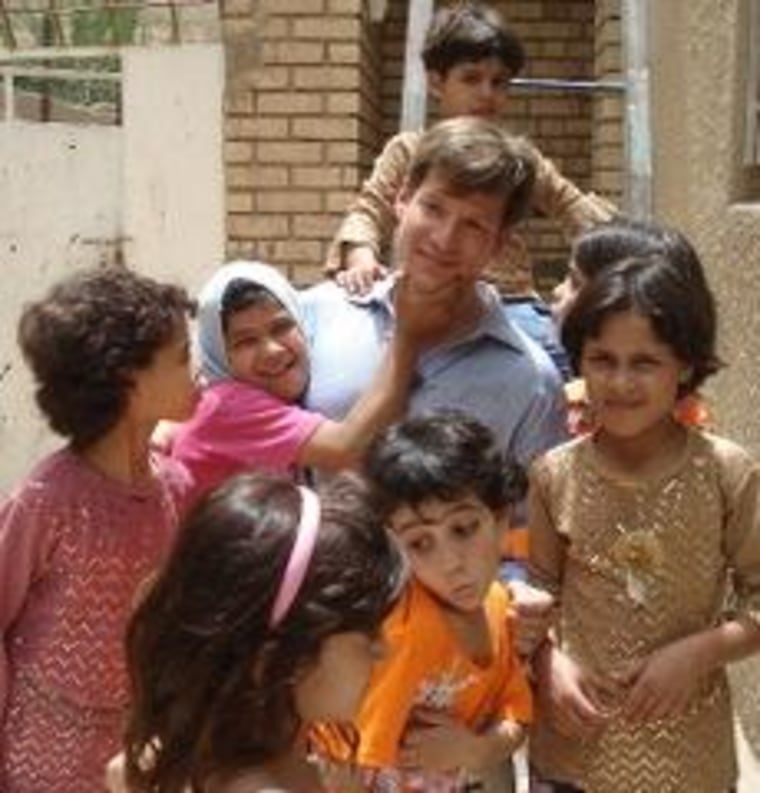For the last three and a half years reporting on the war in Iraq, I’ve covered events like American military offensives, the capture of Saddam Hussein, the death of Al Qaida leader Abu Musab Zarqawi, and the seemingly endless car bombings.
But few stories have affected me as much as a recent visit to a Baghdad orphanage to cover the children whose parents have been killed in the war.
There is no accurate figure for the number the ‘war orphans’ in Iraq, but Iraqi officials estimate there are now thousands of them.
Baghdad’s Alwiya Orphanage is home to 56 girls ages 6 to 13. I was struck by their smiles and tenderness and the sadness they hide.
Here, huddled together, we found the Hussein sisters: Marwa, serious and already grown up at 13; Alliya, 10 years old and detached; and little Sora—six and mischievous.
Two years ago, they were orphaned overnight, when gunmen burst into their home and executed their parents.
"I heard the shots," says Marwa. "My father was still breathing, but my mother died right away."
Today, when Alliya hears gunfire, she thinks people are trying to shoot at her. "I dream about when my parents were killed and wake up scared," she says.
The girls try to live day to day, but even that is difficult. They can’t play out in the open—it’s too dangerous. They can only go as far as the courtyard and not always.
During a recent visit, the girls were rushed to a back room when a group of men with guns showed up at the front door.
The “militants” turned out to be just policemen looking for insurgents. But it is all part of tension the girls live with daily.
They say they are frightened a lot of the time. One of the girls said she’s afraid of dying. It’s something a lot of the orphans have to deal with.
Marwa is trying to hold together what’s left of her family. She has become a little mother to her sisters, washing their clothes… tending to their needs. And all the while, Marwa dreams about being able to talk to her parents.
She says if she could talk to them, she would tell them, "I love you."
From our visits to the orphanage, it’s really clear to us that these girls are starved for attention. They’ve been coming up all day and just taking our hands. One girl called our cameraman “daddy.” The director of the orphanage says what they miss most is tenderness, their mother’s touch.
One girl asked if I had any children and if I would take her with me. I wanted to bundle them all up and find them homes, especially when experts told us their future looks bleak. Under Islamic law, adoption is difficult. Foreigners are banned entirely and with so many families separated by war, it’s hard to even locate relatives who might care for the children.
Making matters worse, in Iraqi society, orphans are often considered “damaged.” They are stigmatized and have few opportunities outside the orphanage. Many stay there as adults, working as caregivers. Or even worse, when the girls turn 18, they have been known to live on the streets, becoming prostitutes.
Still, the girls have dreams, hopes. Alliya wants to be a teacher. Marwa, a doctor.
The visits to the orphanage were diversions for the girls. And after covering so much bloodshed, they were diversions for us as well. They’re also reminders of the sometimes forgotten victims of this war and its lingering casualties.
As we left, we met 13-year-old Dunya. Her mother dropped her off here six months ago. Dunya asked if she could use our cell phone to call her. But her mother didn’t answer. The woman who did told Dunya her mother had moved to Syria. While we watched, Dunya learned she was abandoned.
I left with their faces etched in my memory, wishing I could do more, wishing these children could have hope for a more promising future.
